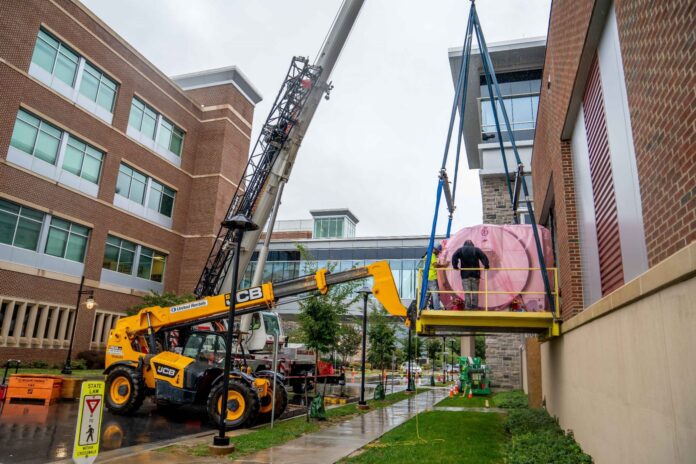The Fralin Biomedical Research Institute at VTC has installed a new magnetic resonance imaging (MRI) scanner to advance research applications for human and animal health. MRI is a noninvasive imaging technique that uses magnetic fields to visualize tissue structure and function.
The machine is the second Siemens Prisma MRI 3.0 Tesla scanner at the research institute, and is part of a wide array of scanning equipment available to Virginia Tech researchers, including four other MRI scanners, CT scanners, and an optically pumped magnetometry facility.
The MRI equipment allows scientists to study and target living tissue in extremely high anatomical detail.
The new Prisma will be used for research in conjunction with the institute’s Insightec Exablate Focused Ultrasound system – new technology that allows soundwaves to be focused on an area as small as a millimeter to treat brain disorders.
Fralin Biomedical Research Institute scientists will research potential uses for focused ultrasound, including treatment of addiction and pain.
“MR-guided focused ultrasound provides the opportunity to treat major disorders in both human and companion animal patients that manifest in deep structures in the body, including the brain, without invasive surgical procedures,” said Michael Friedlander, Virginia Tech’s vice president for health sciences and technology and the Fralin Biomedical Research Institute’s executive director. “This new facility was made possible by a combination of support from the commonwealth and the Edward N. and Della L. Thome Foundation with a focus on research, development and application of MR–guided focused ultrasound for treating a variety of disorders that particularly affect the brain during aging, such as neurodegenerative diseases like Parkinson’s and essential tremor, as well as brain tumors that tend to manifest more frequently during aging.”
The technology is being evaluated for use in the treatment of solid tumors and other neurological disorders deep inside the brain.

